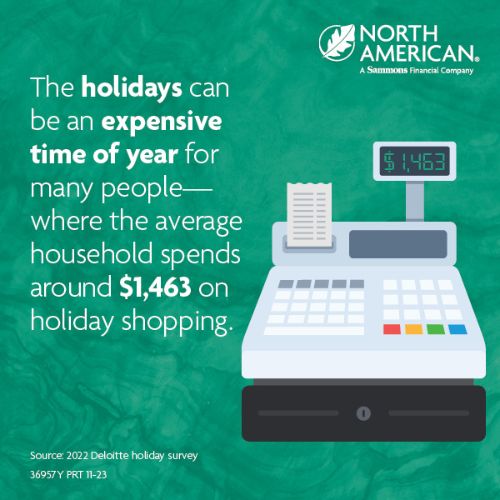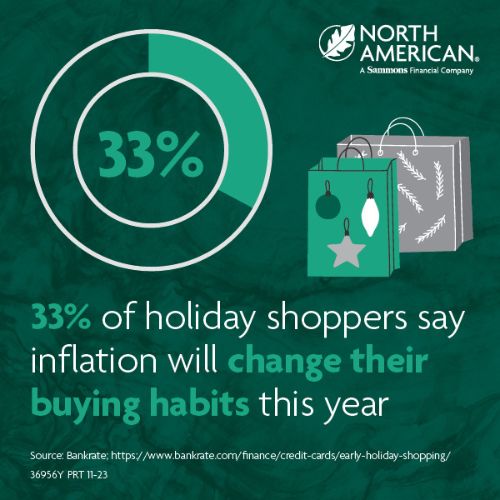
Five ways to avoid overspending during the holidays
Jul 8, 2024, 4:51:35 PM | Reading Time: 4 minutesThe average household spends around $1,463 on holiday shopping, and over a third of Americans will head into the New Year with debt due to end-of-year spending. Adding to inflation and the rising cost of items, many people may experience extreme financial stress when the holiday season arrives. Gift-giving can be a fun and exciting experience, but you also don’t want to go beyond what your budget allows, putting you in a tough financial spot. Creating a holiday budget and putting a plan in place early can help curb overspending and greatly reduce money stress surrounding this time of year. Here are five budgeting tips to help control holiday spending.
1. Set your holiday budget
Creating a budget with clear limits is important in managing holiday spending. When you set the maximum amount before the holidays, you are more likely to steer clear of unnecessary expenses. You can better prioritize how your money will be spent. This budget should also include food and drink costs, purchases needed for events or gatherings, and travel expenses. If this makes sense for your financial situation, you can break down your holiday budget into these categories and estimate how much you will need to spend in each.
Ways to budget for holiday spending
Whether you prefer a handwritten log or helpful technology, there are multiple ways to maintain a budget and keep track of expenses. It can be as simple as keeping a running tally of your payments in a notebook or spreadsheet and updating your remaining amount. Alternatively, you can use numerous budgeting apps that track spending, categorize expenses, and connect with your accounts. You can set limits for each category and set up alerts to notify you if you’re getting close to these amounts. No matter what method you choose, actively monitoring your spending can be important in setting you up for financial success.
2. Set up a holiday savings account
Setting up a holiday savings account through a financial institution is a helpful way to set aside money year-round that is only accessed for the holiday season. You can routinely deposit money to this designated account. Since many of these accounts can only be accessed after a set date, you can avoid dipping into these savings for other purposes. Several of these accounts also allow you to earn interest on your balance and make unlimited deposits. Check with your bank or credit union to see if they offer holiday accounts and set up automatic deposits to help build up your funds.
3. Plan to avoid debt during the holidays
A good goal to strive for during the holidays is to avoid racking up debt you cannot pay down in a reasonable amount of time. By establishing a budget early in the year, you can begin to set aside money specifically for holiday expenses. If you have this money only allocated for holiday-related purchases, you can pay off your credit card bill in full or in much less time, avoid interest fees, and begin the New Year in debt.

4. Tips for avoiding holiday debt
If the holiday season raises your stress levels, you’re not alone. Over two-thirds of consumers said they’re feeling wary about the financial strain of the holiday season. In addition to proper preparation and budgeting, there are a few other ways to help lessen holiday anxiety and let yourself focus on enjoying time with family and friends. If possible, begin shopping well in advance, allowing the costs to be spread out and more easily paid. Look for sales and items on clearance throughout the year that can be set aside. You can also discuss other gift ideas with your loved ones, like exchanging homemade gifts, taking a day trip together, planning a movie night, or signing up for a cooking class.
5. Prepare for the impact of inflation
Holiday shopping inflation is a big concern for many people, where 33% of holiday shoppers say inflation will change their buying habits this year. Rising costs can make it even more challenging to stretch every dollar and avoid going into debt as purchases ramp up. You may need to decrease the number of items you buy this year, find inexpensive and creative ways to celebrate with loved ones and take advantage of coupons and discounts as much as possible. Check out websites and apps that allow you to compare shops to find the best deals.
Practice good spending habits year-round
Getting your year-round spending habits in top shape can put you in a better position for the holidays and can lessen financial strain in the months before and after. As you review your finances, try to spot where you can cut costs. Are there streaming services or memberships you no longer use? Can you reduce impulse buying, eating out at restaurants, or food delivery? Good money habits can be valuable tools in combatting overspending and improving your overall financial well-being.

How do I control my spending?
Budgeting apps can be helpful during the holidays and can keep your spending in check all year long. Several apps allow you to track your budget on your computer or mobile device conveniently and can reveal valuable insight into your spending habits. Where is your money going each month? Are there areas where you could cut back your spending? By knowing exactly where your money is going throughout the year, you can be better informed about how to save more and spend less. As the holidays approach each year, you may feel a rise in financial stress, but the more you plan and take a proactive approach to budgeting, the better chance you’ll have at being able to relax during the holidays, keep your debt level down, and start the New Year in a solid financial position.
B1-NA-11-23
